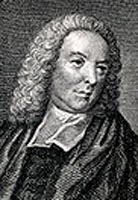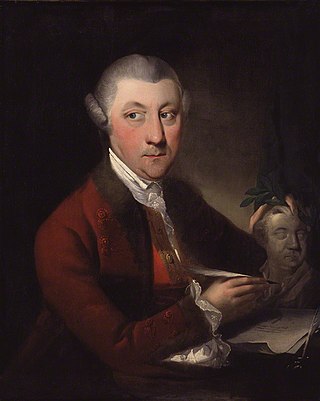Related Research Articles

Edward Young was an English poet, best remembered for Night-Thoughts, a series of philosophical writings in blank verse, reflecting his state of mind following several bereavements. It was one of the most popular poems of the century, influencing Goethe and Edmund Burke, among many others, with its notable illustrations by William Blake.

Frederick Howard, 5th Earl of Carlisle was a British peer, statesman, diplomat, and author.
The Wakadoshiyori (若年寄), or "Junior Elders", were high government officials in the Edo period Japan under the Tokugawa shogunate (1603-1867). The position was established around 1633, but appointments were irregular until 1662. The four to six wakadoshiyori were subordinates to the rōjū in status, but they ranked above the jisha-bugyō. The served for a month at a time on a rotating basis and were selected from the ranks of the fudai daimyō. There were periods when the number of wakadoshiyori rose to 6 or 7 at one time.
John Swinton (1703–1777) was a British writer, academic, Fellow of the Royal Society, Church of England clergyman and orientalist. In 1731 he was a fellow of Wadham College, Oxford, but migrated to Christ Church in 1745. He contributed to George Sale's Universal History. Swinton also contributed articles on the transcription of the 'Ruins of Palmyra'. Beginning in 1749, Swinton donated a number of Roman coins to the collection at Christ Church. From 1767 until the year of his death he was Keeper of the Archives at Oxford University.
John Duncombe was an English clergyman and writer.
James Merrick (1720–1769) was an English poet and scholar; M.A. Trinity College, Oxford, 1742: fellow, 1745: ordained, but lived in college. It is said that "[h]e entered into holy orders, but never could engage in parochial duty, from being subject to excessive pains in his head". He published poems, including The Chameleon; translated from the Greek and advocated the compilation and amalgamation of indexes to the principal Greek authors; versified the Psalms, several editions of which were set to music. His work was featured in Oxford religious poetry anthologies.

Joseph Trapp (1679–1747) was an English clergyman, academic, poet and pamphleteer. His production as a younger man of occasional verse and dramas led to his appointment as the first Oxford Professor of Poetry in 1708. Later his High Church opinions established him in preferment and position. As a poet, he was not well thought of by contemporaries, with Jonathan Swift refusing a dinner in an unavailing attempt to avoid revising one of Trapp’s poems, and Abel Evans making an epigram on his blank verse translation of the Aeneid with a reminder of the commandment against murder.
John Law (1745–1810) was an English mathematician and clergyman who began his career as a Fellow of Christ's College, Cambridge, and went on to become chaplain to the Lord Lieutenant of Ireland and Church of Ireland bishop of Clonfert and Kilmacduagh (1782–1787), Killala and Achonry (1787–1795), and finally of Elphin (1795–1810).
Henry Jones (1721–1770), born in Ireland, was a poet and dramatist active in London.
GlocesterRidley (1702–1774) was an English miscellaneous writer.
Michael Lort (1725–1790) was a Welsh clergyman, academic and antiquary.
Thomas Rutherforth (1712–1771) was an English churchman and academic, Regius Professor of Divinity at Cambridge from 1745, and Archdeacon of Essex from 1752.
Benjamin Victor was an English theatrical manager and writer.
Jabez Earle, D.D. (1676?–1768), was an English Presbyterian minister. He had a career of nearly 70 years as a London preacher.
George Sewell was an English physician and poet, known as a controversialist and hack writer.

Thomas Hull (1728–1808) was an English actor and dramatist.
Edward Clarke (1730–1786) was an English cleric and author.
William Popple (1701–1764) was an English official, dramatist and Governor of Bermuda.
John Denne D.D. (1693–1767) was an English churchman and antiquarian, Archdeacon of Rochester from 1728.
References
- . Dictionary of National Biography . London: Smith, Elder & Co. 1885–1900.
- Attribution
![]() This article incorporates text from a publication now in the public domain : "Howard, Leonard". Dictionary of National Biography . London: Smith, Elder & Co. 1885–1900.
This article incorporates text from a publication now in the public domain : "Howard, Leonard". Dictionary of National Biography . London: Smith, Elder & Co. 1885–1900.